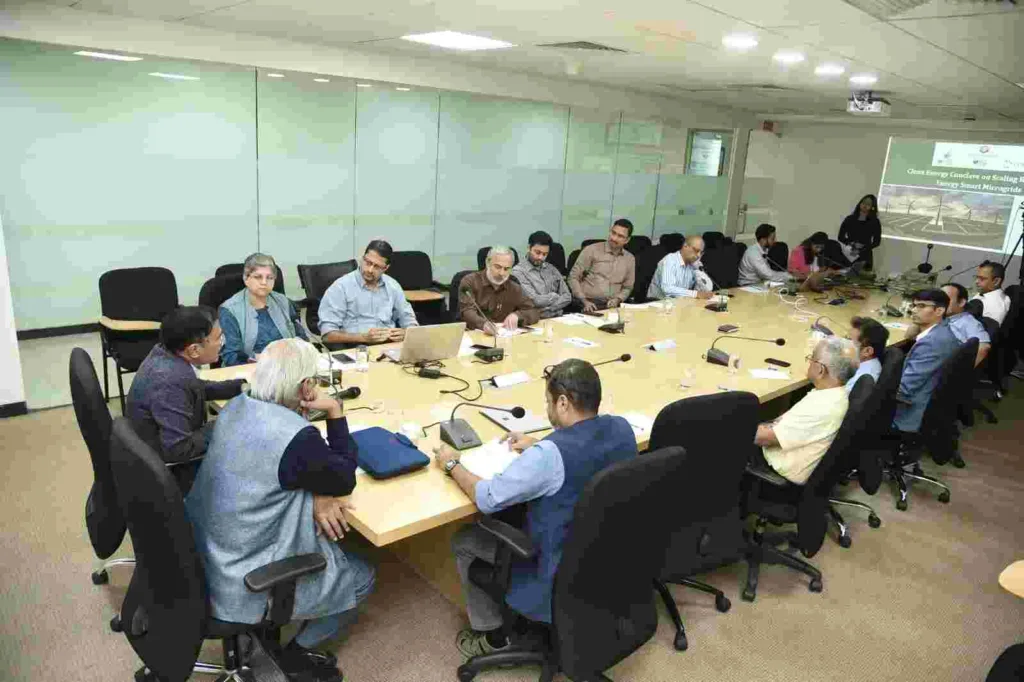Pune : Cutting real estate sector emissions in focus at PIC roundtable

Pune : Cutting real estate sector emissions in focus at PIC roundtable
PUNE: The benefits, ways, and urgency of reducing carbon footprint of the real estate sector was in focus at the recent PIC roundtable on ‘Decarbonising Real Estate Sector in Pune Metropolitan Region’.
At the event organised by PIC’s Energy, Environment and Climate Change (EECC) research vertical and VK:e Environmental on January 30, experts from the fields of architecture, energy and environment from the Pune Region deliberated on how the sector can contribute to reducing carbon emissions.
Pointing to statistics showing that the real estate sector can contribute to reducing 26% of emissions, Mr. Ranjit Naiknaware, programme Chair, and President, CREDAI Pune-Metro, said the enormity of the issue is so great that unless we make it statutory to cut carbon emissions, we will miss the bus.
Co-chair and keynote speaker, and Director of VK:e Environmental, Poorva Keskar, said cities are CO2 hotspots due to their dense population and high energy use, which accounts for 80 percent of emissions from the real estate sector, air conditioning being one of the main factors. She said cutting emissions in existing buildings is one of the “low-hanging fruits” and can be achieved at a low cost.
In the session on ‘Design considerations for low-carbon development’, invited speaker Dr. Sunita Purushottam, Head, Sustainability, Mahindra Lifespace Developers Ltd, warned climate change will get worse and we need to adopt climate responsive design strategies, like retaining trees and ensuring thermal comfort in buildings. In the session on ‘Operational Decarbonisation’, Mr. Sandip Sonigra, MD, Orange County Group, spoke about renewable energy sources and the need to build a culture of sustainability.
In the session on ‘Sustainable Redevelopment’, Mr. Ganesh Jadhav, Co-founder, Gangotree Homes and Holidays, spoke on green buildings and what sustainability means to the common man. Prof. Amitav Mallik, Head, EECC, and Trustee, PIC, stressed on the need to bend the curve and said carbon emissions can be much less in 2030 than in 2020.
The recommendations of the roundtable will be compiled into a report and shared with the government, industry leaders, and stakeholders.
Earlier in the day, a roundtable on ‘Clean Energy Conclave: Scaling Renewable Energy Smart Microgrids’ was held under the guidance of Prof. Amitav Mallik as part of EECC’s flagship project on Rapid De-carbonization potential of Pune Metropolitan Region (PMR). Chaired by Mahesh Zagade, former Principal Secretary to the Government of Maharashtra, ex-IAS, it aimed to understand current technology and government policies to explore the potential of these technologies, their scalability and probable financial models to formulate a business strategy.
Centre for Sustainable Development (Gokhale Institute of Politics and Economics) under its HOD Dr. Gurudas Nulkar, and Clean Energy Access Network (CLEAN) under the leadership of its CEO Dr. Priyadarshini Karve also contributed to the discussion. The event saw active participation by key stakeholders in the sector, including MSEDCL, MASMA, IESA, CES, independent consultants, manufacturers, and companies such as Husk and Power Trust, among others. Mahesh Deodhar from CSD-GIPE, along with PIC-EECC researchers Shalvi Pawar and Mr. Chinmay Kulkarni moderated the discussion.
PHOTO CAPTIONS
Pix 1: L to R: Prof. Amitav Mallik, Mr. Ranjit Naiknaware and Dr. Poorva Keskar at PIC EECC’s roundtable on Decarbonising the Real Estate Sector in Pune Metropolitan Region (PMR)
Pix 1a: Participants at PIC EECC’s roundtable on Decarbonising the Real Estate Sector in Pune Metropolitan Region (PMR)
Pix 2: Team EECC members with participants at the PIC EECC’s discussion – ‘Clean Energy Conclave: Scaling Renewable Energy Smart Microgrids’
Pix 2a: Participants at PIC EECC’s discussion – ‘Clean Energy Conclave: Scaling Renewable Energy Smart Microgrids’










